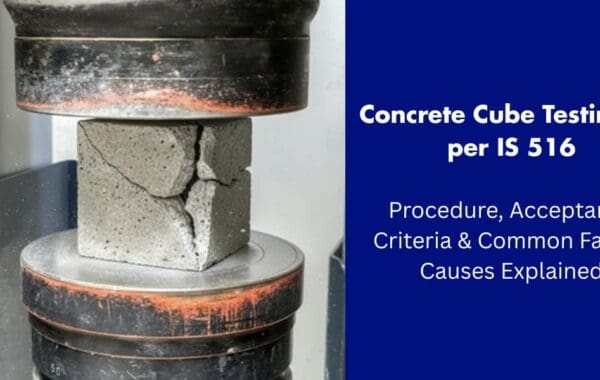The quality and reliability of materials are paramount in construction projects. Here’s a detailed look at the top 10 most crucial material testing methods that ensure the integrity and safety of construction projects.
1. Concrete Compressive Strength Test
Importance: Concrete is the backbone of most construction projects. Its compressive strength indicates its ability to withstand loads without failing.
Method: Cylindrical concrete specimens are cast and cured, then subjected to pressure until they break. The maximum load applied is recorded as the compressive strength.
Impact: Ensures that the concrete mix design can bear the required structural loads, thereby preventing potential structural failures.
2. Soil Testing
Importance: Understanding soil properties is vital for foundation design and stability.
Types of Tests:
- Standard Proctor Test: Determines the optimal moisture content for soil compaction.
- Atterberg Limits Test: Measures the critical water content of fine-grained soils.
- Soil Bearing Capacity Test: Assesses the maximum load soil can support.
Impact: Helps in designing foundations that can safely support the loads of the structure, avoiding issues like settling or shifting.
3. Steel Tensile Strength Test
Importance: Steel is widely used for reinforcement and structural frameworks due to its strength and flexibility.
Method: Steel samples are pulled apart in a tensile testing machine until they break. The stress-strain curve is analyzed to determine tensile strength, yield strength, and ductility.
Impact: Ensures the steel used can withstand the forces it will encounter, contributing to the overall durability of the structure.
4. Aggregate Testing
Importance: Aggregates are a primary component of concrete and asphalt, affecting their quality and performance.
Types of Tests:
- Sieve Analysis: Determines the particle size distribution.
- Los Angeles Abrasion Test: Assesses the toughness and abrasion resistance.
- Specific Gravity and Water Absorption: Evaluates the porosity and density.
Impact: Ensures the aggregates contribute positively to the concrete or asphalt mix, enhancing strength and durability.
5. Water Quality Testing
Importance: Water used in construction must be free from impurities that could affect material properties.
Tests: pH level, turbidity, and presence of dissolved salts and organic matter.
Impact: Ensures that the water used does not adversely affect the setting time and strength of concrete or corrode reinforcement steel.
6. Non-Destructive Testing (NDT)
Importance: Allows for the inspection of materials and structures without causing damage.
Types of NDT:
- Ultrasonic Testing: Detects internal flaws using high-frequency sound waves.
- Radiographic Testing: Uses X-rays or gamma rays to view the internal structure.
- Magnetic Particle Testing: Identifies surface and near-surface defects in ferromagnetic materials.
Impact: Provides a way to ensure the integrity and safety of structures without compromising their usability.
7. Cement Testing
Importance: Cement is a critical ingredient in concrete and mortar, impacting their strength and durability.
Types of Tests:
- Fineness Test: Measures the particle size of cement.
- Consistency Test: Determines the water-cement ratio for optimal workability.
- Setting Time Test: Assesses the time required for cement to set and harden.
Impact: Ensures that the cement used will perform as expected, providing a reliable binder for aggregates.
8. Asphalt Testing
Importance: Essential for the construction of roads, asphalt must meet specific standards for performance and longevity.
Types of Tests:
- Marshall Stability Test: Measures the load-carrying capacity of asphalt.
- Penetration Test: Assesses the hardness or softness.
- Viscosity Test: Evaluates the flow characteristics.
Impact: Ensures that the asphalt mix will withstand traffic loads and environmental conditions, reducing maintenance needs.
9. Brick Testing
Importance: Bricks are fundamental to masonry construction, and their quality affects the overall strength of the structure.
Types of Tests:
- Compressive Strength Test: Determines the load-bearing capacity.
- Water Absorption Test: Assesses the porosity.
- Efflorescence Test: Checks for salt deposits that could affect aesthetics and strength.
Impact: Ensures that the bricks used are durable, strong, and free from defects that could compromise structural integrity.
10. Fire Resistance Testing
Importance: Fire safety is a critical concern in construction, ensuring that materials can withstand high temperatures without losing integrity.
Method: Materials are exposed to controlled fire conditions, and their resistance to fire, structural stability, and insulation properties are assessed.
Impact: Ensures that the materials used will help protect the structure and its occupants in the event of a fire, meeting safety regulations and standards.
Conclusion
The rigorous testing of construction materials is essential for ensuring the safety, durability, and longevity of infrastructure projects. By adhering to these top 10 crucial material tests, builders, architects, and real estate developers can confidently move forward with projects that are built on a foundation of quality and reliability. Partnering with trusted testing laboratories like Global Lab ensures that these tests are conducted accurately and efficiently, providing the critical data needed for successful construction.



